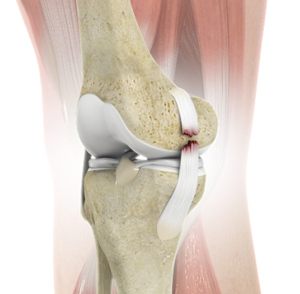
What is the MCL?
The medial collateral ligament (MCL) is the ligament located on the inner part of the knee joint. It runs from the femur (thighbone) to the top of the tibia (shinbone) and helps in stabilizing the knee.
Causes of MCL Tears
An MCL injury can result in a stretch, partial tear or complete tear of the ligament. Injuries to the MCL commonly occur because of pressure or stress applied the outside of the knee. The MCL injury can also tear the anterior cruciate ligament (ACL).
Symptoms of MCL Tears
An MCL tear can be associated with pain, swelling, and locking or catching sensation in the knee during movement. You may also feel as though your knee may buckle or give way suddenly.
Diagnosis of MCL Tears
Your doctor will usually diagnose an MCL injury based on a physical examination of your knee. To determine looseness of the ligament, an MCL test may be performed by exerting pressure on the outside of your knee while it is bent at 25 degrees. In addition, imaging tests such as X-rays and MRI scan may be ordered.
Treatment of MCL Tears
Treatment options include non-surgical and surgical treatment. Non-surgical treatment consists of rest, ice, compression and elevation (RICE protocol), which assists in controlling pain and swelling. A knee brace may be worn to help immobilize your knee. The use of crutches may be recommended to protect and keep you from applying weight on your knee while walking. Physical therapy exercises may be recommended to improve knee motion and strength.
Most often, surgery is not necessary for the treatment of an MCL tear. If needed, it is usually performed using arthroscopy. In many cases, this injury cannot be prevented. However, using proper techniques during sports or exercising can help prevent injury.
Related Topics:
- Chondromalacia Patella
- Jumper's Knee
- Kneecap Bursitis
- Iliotibial Band Syndrome
- Lateral Patellar Compression Syndrome
- Fractures of the Tibia
- Osteochondritis Dissecans of the Knee
- Medial Patellofemoral Ligament (MPFL) Tears
- Knee Injury
- Unstable Knee
- Goosefoot Bursitis of the Knee
- Knee Sprain
- ACL Tears
- MCL Tears
- MCL Sprains
- Meniscal Injuries
- Meniscal Tears
- Fractures of the Patella
- Knee Ligament Injuries
- Multiligament Instability
- Knee Arthritis
- Knee Pain
- PCL Injuries
- Chondral or Articular Cartilage Defects
- Patellar Instability
- Patellofemoral Instability
- Patella Fracture
- Recurrent Patella Dislocation
- Quadriceps Tendon Rupture
- Patellar Tendon Rupture
- Lateral Meniscus Syndrome
- Tibial Eminence Spine Avulsion Fracture
- Posterolateral Instability
- Osteonecrosis of the Knee
- Knee Angular Deformities
- Hoffa's Fat Pad Syndrome
- Posterolateral Corner Injuries
- Osteochondral Defect of the Knee
- Knee Dislocation
- Lateral Patellar Instability
- Medial Patellar Instability
- Medial Gastrocnemius Strain
- Distal Femur Fracture
- Terrible Triad Injuries
- Articular Cartilage Injury (Knee)
- Chronic Hamstring Tendinopathy
- Tibial Shaft Fracture
- Patellar Tracking Disorder/Patellar Maltracking
- Knee Fracture
- Knee Osteoarthritis
- Knee Sports Injuries
- Tibial Plateau Fracture
- Patellar Tendinitis
- Periprosthetic Knee Infection
- Medial Meniscus Syndrome
- Knee Stress Fractures
- Osgood Schlatter Disease
- Multiligament Knee Injuries
- Quadriceps Tendon Rupture and Repair
- Patellofemoral Arthritis
- Tibial Eminence Fractures
- Knee Effusion
- Stress Fracture of the Tibia
- Anterior Knee Pain
- Runner's Knee








